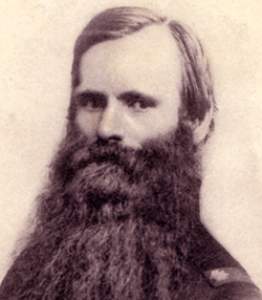George Luther Stearns (American National Biography)
Scholarship
By 1856 Stearns was deeply involved in the antislavery struggle in Kansas. As chair of the Kansas Committee of Massachusetts, Stearns raised money (much of it his own) to purchase Sharpe's rifles and other supplies to support the free state settlers in their fight against proslavery Missourians and a federally supported proslavery territorial government at Lecompton, Kansas. Deeply impressed with John Brown's call for retributive justice, Stearns became an important financial backer of the guerrilla chieftain in Kansas and joined the "Secret Six" in supporting and financing Brown's plans to extend his antislavery guerrilla war into Virginia.
After Brown's raid on the federal arsenal at Harpers Ferry, Stearns and a fellow conspirator, Samuel Gridley Howe, fled briefly to Montreal. But Stearns returned to defend his actions before a Senate committee investigating the role of "subversive organizations." He admitted that he supported Brown's efforts to "go into Virginia or some other state and relieve slaves," but he denied any knowledge of plans to commit treason against the United States. The committee uncovered no evidence to indicate that Stearns or anyone else outside Brown's raiding party had such knowledge.
After Brown's raid on the federal arsenal at Harpers Ferry, Stearns and a fellow conspirator, Samuel Gridley Howe, fled briefly to Montreal. But Stearns returned to defend his actions before a Senate committee investigating the role of "subversive organizations." He admitted that he supported Brown's efforts to "go into Virginia or some other state and relieve slaves," but he denied any knowledge of plans to commit treason against the United States. The committee uncovered no evidence to indicate that Stearns or anyone else outside Brown's raiding party had such knowledge.
Louis S. Gerteis, "Stearns, George Luther," American National Biography Online, February 2000, http://www.anb.org/articles/04/04-00946.html.



